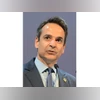India and Greece will work to quickly finalise the proposed migration and mobility pact outlined by both nations, Prime Minister (PM) Narendra Modi, and Greek PM Kyriakos Mitsotakis said in a press statement on Wednesday.
The pact is expected to be along the lines of similar ones signed with other European partners and is expected to allow easier movement of Indian skilled labour to Greece.
“We discussed concluding the migration and mobility partnership agreement between the two countries as soon as possible. This will further strengthen our people-to-people relations,” Modi said after his bilateral meeting with Mitsotakis, who is in India on a two-day State visit.
When it comes to shaping global debates and addressing great challenges, India is now often regarded, and rightly so, as a consensus builder and a voice of reason in an increasingly polarised world, the Greek PM said.
“Today, India is a great power on the world stage and an important ally in pursuit of peace and security — a rising force at the heart of G20 and a leading player in the fight against climate change,” he said.
In December 2023, Business Standard reported that Greece has approached India to send up to 10,000 seasonal agricultural workers, while Italy has sought workers to staff municipal duties in its emptying towns.
The Mediterranean country is facing an acute shortage of at least 70,00 workers in Greece for the domestic production of vegetables, fruit, olive oil, and milk.
More From This Section
The Ministry of External Affairs data shows 12,300 Indians living in the country.
According to the Indian embassy in Athens, most are from Punjab and are employed as farm, factory, or construction workers.
India-Greece ties were upgraded to the level of a strategic partnership six months ago during the visit by Modi to Athens.
“We emphasised increasing cooperation in many areas like pharmaceutical, medical device, technology, innovation, skill development, and space,” the PM said.
He also emphasised promoting cooperation between higher education institutions of the two countries. Both nations have decided to prepare an action plan to celebrate the 75th anniversary of diplomatic relations between India and Greece next year.
Both nations have also set up a working group for defence and will increase mutual coordination on common challenges like defence, cybersecurity, counter-terrorism, and maritime security.
“We have agreed to link the defence industries of both countries. India and Greece have common concerns and priorities in the fight against terrorism. We discussed in detail how to further strengthen our cooperation in this area,” Modi said.
Last year, the nations held one of their largest-ever naval joint exercises in Greece. Meanwhile, the country’s Air Force chief visited India in June 2023 and met the military brass here.
The PM also made a pitch for Greece to become an important component of the India-Middle East-Europe Economic Corridor (IMEC).
Launched during India’s G20 chairmanship, the IMEC corridor will contribute significantly to the development of humanity in the long run, Modi said.
Greece can also become an important partner in this initiative, he added.
Focus on India
Mitsotakis was also the chief guest and delivered the keynote address at the ninth edition of the annual geopolitical conference Raisina Dialogue, on Wednesday.
Strengthening the partnership with India should be the cornerstone of Europe’s and Greece’s foreign policy, he stressed.
“We have made good progress over the past years towards achieving that goal, but we have much further to go,” he said.
“India’s status is reflected in the strategic relations that the European Union enjoys with India. Greece, given its geographic, cultural, and strategic proximity, can act as an interlocutor between India and Europe, the global North and the Global South, and between East and West,” he said.
On his part, Mitsotakis stressed his country welcomes the IMEC, arguing the corridor holds great promise not only as an economic solution but as a peace project.
“We (Greece) are your natural doorstep to Europe and beyond. The war in Gaza and the turmoil in the Middle East is undoubtedly destabilising but does not undermine the profound powerful logic behind IMEC,” he stressed.
Mitsotakis described the conflict in Ukraine as much more than a “local war on European soil” and that it is a “brutal challenge” to international stability and the rules-based order that India has supported.
Mitsotakis’ visit is the first bilateral Head of State or government-level visit from Greece to India after 15 years.

)
